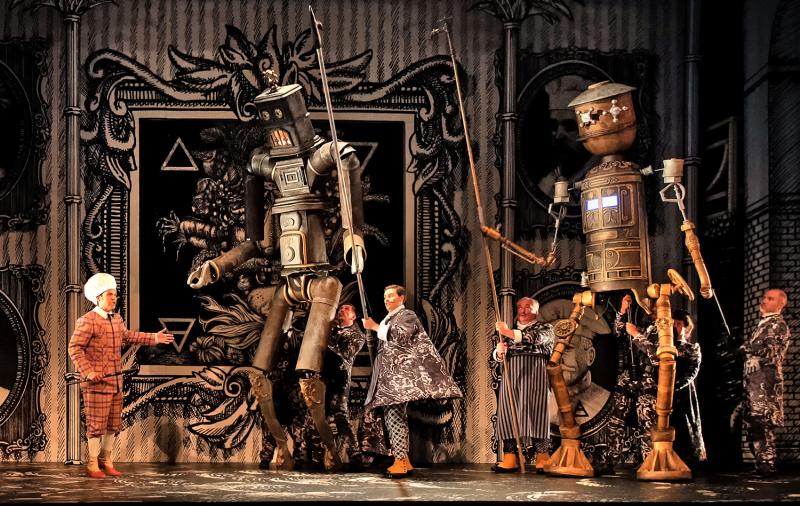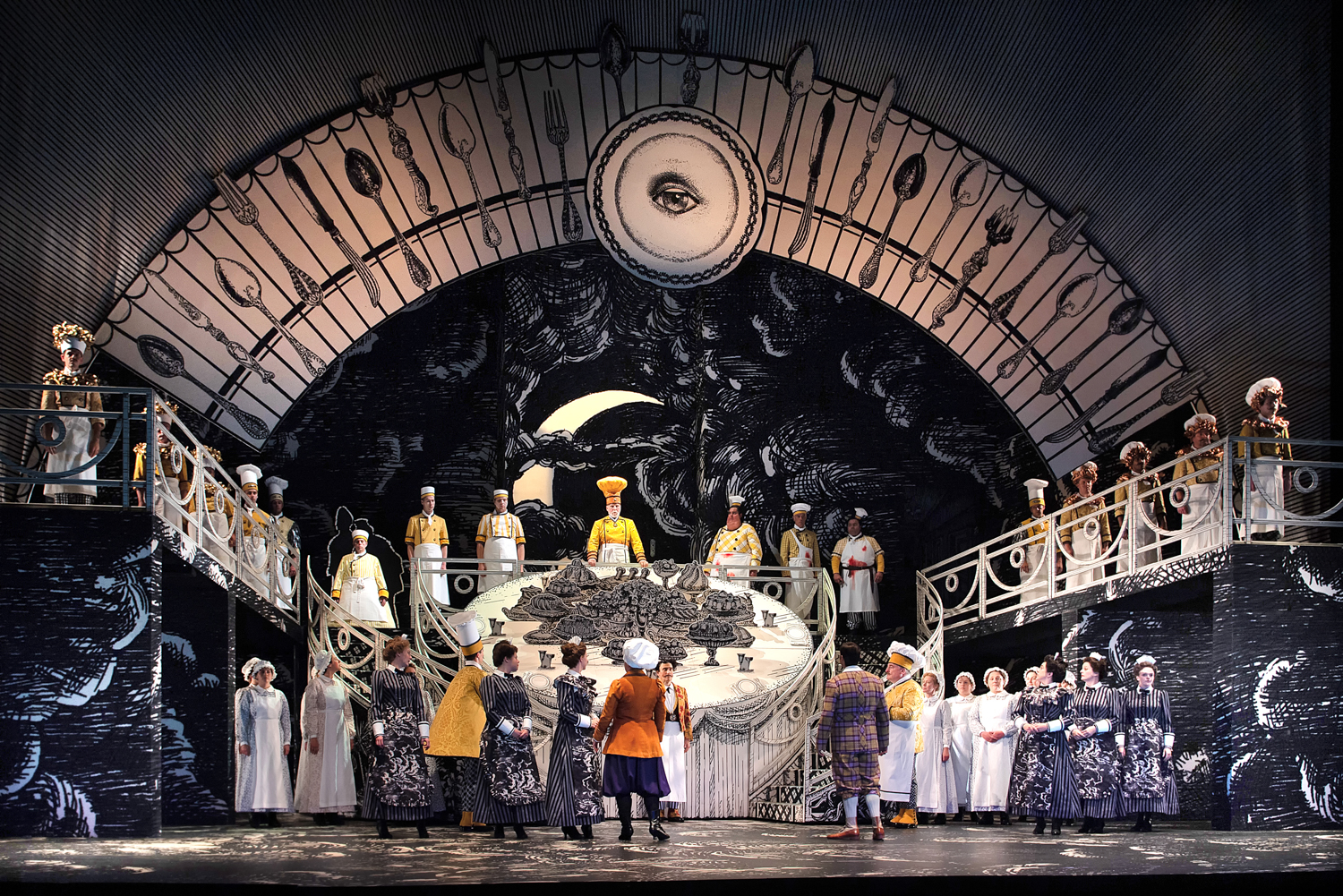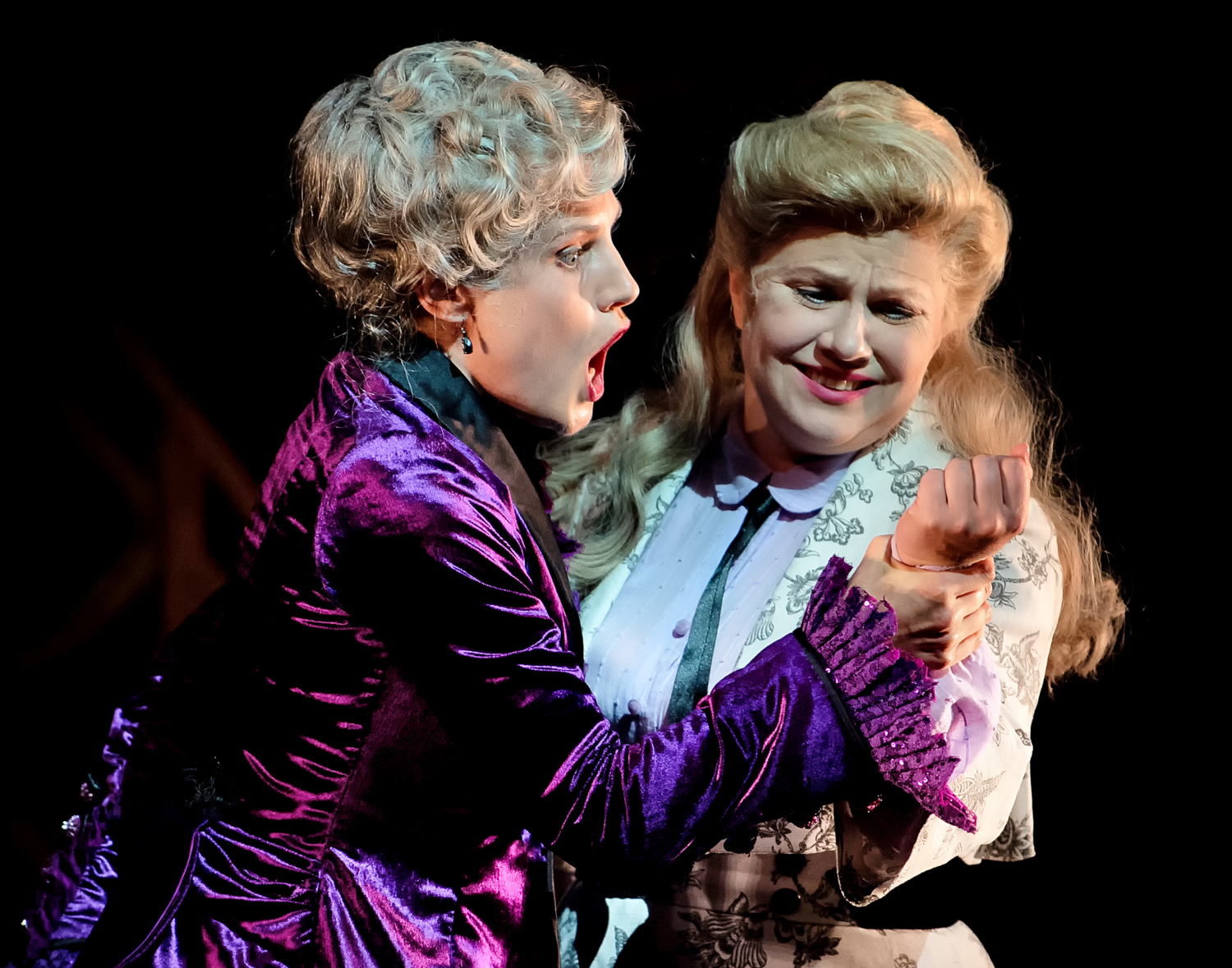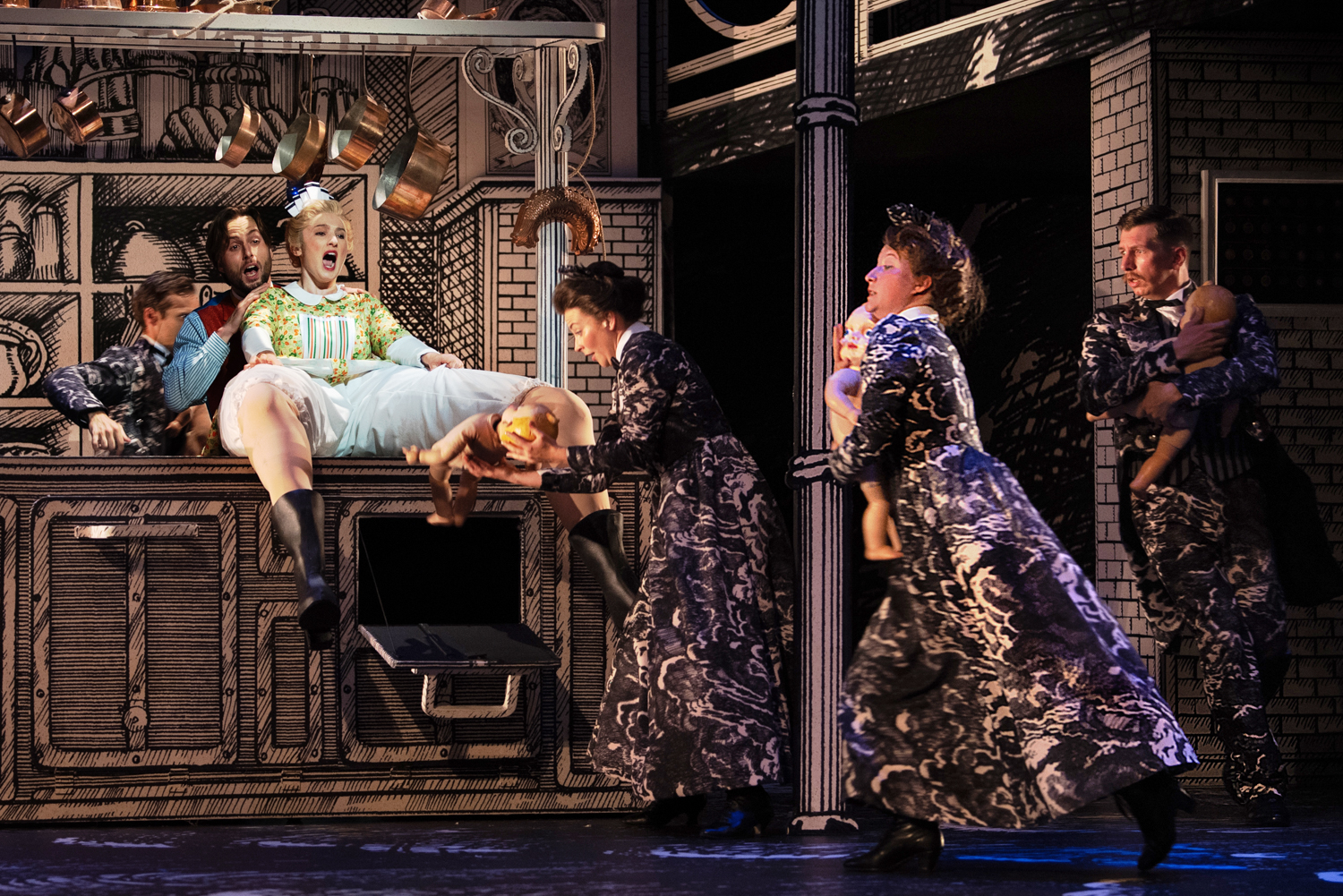Die Zauberflöte, Glyndebourne Festival review – high jinks in the Grand Mozart Hotel | reviews, news & interviews
Die Zauberflöte, Glyndebourne Festival review – high jinks in the Grand Mozart Hotel
Die Zauberflöte, Glyndebourne Festival review – high jinks in the Grand Mozart Hotel
Some delicious singing cuts through fanciful upstairs-downstairs frolics

Die Zauberflöte rarely attracts the plain cooks of the operatic world. Mozart’s farewell opera chucks so many highly-spiced ingredients into its outlandish pot – pantomime and parable, burlesque and ritual – that many productions opt for one show-off recipe that promises to unify all its flavours into a single, spectacular dish.
The Franco-Canadian design-and-direction duo of (André) Barbe & (Renaud) Doucet have actually set their Flute within an Edwardian grand hotel. Here, in this stratified society in miniature, the Queen of the Night – an anguished, smoking Suffragette who seems to have drifted in from a Henry James novel – rules uneasily from her top-floor suite. Meanwhile, head chef Sarastro commands his all-male cult of mystical cooks – should we call it the pastry patriarchy? – in the lower depths of the kitchens and cellars below. Lavishly designed and staged, strongly sung, stuffed with arresting and (sometimes) inspired titbits of stage business, the Barbe-Doucet Zauberflöte nonetheless tends to overcook its directorial delicacies.
Thankfully, the simple loveliness of the singing at its best cuts through the overpowering imagery and trickery that threatens to smother it. Capably voiced by a young but accomplished cast, played with gusto and finesse by the Orchestra of the Age of Enlightenment under Ryan Wigglesworth, it’s Mozart’s music that offers the easiest escape route from this five-star luxury prison. From time to time, I yearned to close my eyes, listen hard, and stop thinking about precisely what it means to present The Magic Flute as a fanciful mash-up of Masterchef and Star Wars, but slathered in the style of Wes Anderson’s Grand Budapest Hotel.
 All the same, I can see the point of compressing the fantasy landscapes of Emanuel Schikaneder’s libretto into a single setting. In Barbe & Doucet’s vision, Tamino’s quest for Pamina, and the pair’s purifying ordeals, take place within and against the upstairs-downstairs hierarchy of an institution where battles for status expose the fault-lines of class and gender. Neo-Baroque staircases and balconies on the plusher levels, and below-stairs glimpses of kitchens and basements (pictured above by Bill Knight) thronged with an army of bustling servants, make this divided realm vividly present. Monochrome backdrops painted with a bewildering array of naturalistic details and occult motifs (the latter a nod to the Masonic symbolism of Die Zauberflöte) add a vertiginous quality to the spaces that frame the action. For me, these sinister cloths suggested not just the architectural nightmares of a Piranesi etching but the gloomy passageways in Mervyn Peake’s Gormenghast novels – stories which also feature a “great kitchen” in a labyrinthine castle, where devious plots hatch.
All the same, I can see the point of compressing the fantasy landscapes of Emanuel Schikaneder’s libretto into a single setting. In Barbe & Doucet’s vision, Tamino’s quest for Pamina, and the pair’s purifying ordeals, take place within and against the upstairs-downstairs hierarchy of an institution where battles for status expose the fault-lines of class and gender. Neo-Baroque staircases and balconies on the plusher levels, and below-stairs glimpses of kitchens and basements (pictured above by Bill Knight) thronged with an army of bustling servants, make this divided realm vividly present. Monochrome backdrops painted with a bewildering array of naturalistic details and occult motifs (the latter a nod to the Masonic symbolism of Die Zauberflöte) add a vertiginous quality to the spaces that frame the action. For me, these sinister cloths suggested not just the architectural nightmares of a Piranesi etching but the gloomy passageways in Mervyn Peake’s Gormenghast novels – stories which also feature a “great kitchen” in a labyrinthine castle, where devious plots hatch.
Further visual enrichment comes from Patrick Martel’s puppets, expertly handled by a half-dozen puppeteers. This shadow-cast of figures ranges from miniature homunculi in the garbs of Tamino or Papageno through a super-sized dancing pig in the kitchen, the dragon-serpent that pursues Tamino at the outset, and (the absolute pièce de résistance) the two enormous armoured giants that we meet, striding and clanking across the stage, in the second act. Moments like this deliver genuine coups de théâtre: they’re terrific fun as well.
All the while, serving-hatches, pantries, stoves and cupboards regularly open or close to disgorge funny business at almost every turn. These comic, but dream-like, episodes of reversal and transformation thicken the texture even more. Whether in the glowing sci-fi toques worn by Sarastro and his kitchen crew, or the light-show that creates visual rhymes for Papageno’s tinkling bells, an unflagging pulse of wit and ingenuity ticks through this Flute from overture to finale. Gags to relish and stunts to admire fill every scene. But what about the human element – the yearning for love, the searching for truth – that drives the journeys towards enlightenment of Tamino, Pamina and Papageno?
 Predictably, Barbe & Doucet do not leave the much-deplored misogyny of the libretto – as power passes from Queen to Priest (or, here, Celebrity Chef) – intact. Many Flutes nowadays challenge the idea of the Queen of the Night as a malevolent tyrant, with Sarastro and his minions as blameless purveyors of esoteric wisdom. From Barbe & Doucet, we had glimpses of a Suffragette demo, with Votes for Women posters, while the Queen wore a rosette for the cause. As troubled proprietor of this swanky but mutinous establishment, Caroline Wettergreen (pictured above, with Sofia Fomina) had a plangent tenderness to match her spells of imperious fury. If, in the first-act aria, "O zittre nicht, mein lieber Sohn", she felt a little scratchy at the dizzying top of her range, her blistering "Der Hölle Rache" after the interval immaculately struck one bull’s-eye after another.
Predictably, Barbe & Doucet do not leave the much-deplored misogyny of the libretto – as power passes from Queen to Priest (or, here, Celebrity Chef) – intact. Many Flutes nowadays challenge the idea of the Queen of the Night as a malevolent tyrant, with Sarastro and his minions as blameless purveyors of esoteric wisdom. From Barbe & Doucet, we had glimpses of a Suffragette demo, with Votes for Women posters, while the Queen wore a rosette for the cause. As troubled proprietor of this swanky but mutinous establishment, Caroline Wettergreen (pictured above, with Sofia Fomina) had a plangent tenderness to match her spells of imperious fury. If, in the first-act aria, "O zittre nicht, mein lieber Sohn", she felt a little scratchy at the dizzying top of her range, her blistering "Der Hölle Rache" after the interval immaculately struck one bull’s-eye after another.
As Pamina, Sofia Fomina achieved not just a lyric richness in her tone, but a sense of radiant stillness that contrasted with the frantic activity around her – as if she were performing in a different, less breathlessly ideas-driven, staging of the work. David Portillo’s honeyed, succulent Tamino and Björn Bürger’s charmingly mischievous and confident Papageno made for a delicious tenor-baritone double act – one clad in tweeds and plus-fours like a racy toff on a spree c.1910; the other draped in garish green like a dodgy bookie on the run. The lusty, spirited Three Ladies at the start of Tamino’s quest, and the angelic interventions of the Three Boys (played as junior bell-hops, very much in Wes Anderson mode), added plenty of savour and spritz to the smaller roles.
Down in the kitchens, Brindley Sherratt’s Sarastro commanded his team – luminous headgear and all – with a masterful authority that hovered just this side of the spine-chilling. His arias – “O Isis und Osiris” and “In diesen heil’gen Hallen” – emerged from their unfathomable depths with the warmth and lustre of vintage teak. For all the weirdness of his kitchen cult, Barbe & Doucet did not quite make him the villain of the piece – besides which, the sheer charisma of this voice would disarm too much sniping scepticism.
 At times, though, I did sense that the director-designers had tipped the scales a shade too far against any cosy or sentimental interpretation of the Flute. When Pamina and Papageno sang their divine duet, “Bei Männern, welche Liebe fühlen”, a creepy puppet dance on the stage’s other side snarkily undercut the hymn to coupledom. And when long-suffering Papageno finally got together with his dream girl Papagena (Alison Rose, pictured above), her instant expulsion of a cluster of doll-babies hinted – with a heavy, farcical hand – that their wedded bliss will be short-lived.
At times, though, I did sense that the director-designers had tipped the scales a shade too far against any cosy or sentimental interpretation of the Flute. When Pamina and Papageno sang their divine duet, “Bei Männern, welche Liebe fühlen”, a creepy puppet dance on the stage’s other side snarkily undercut the hymn to coupledom. And when long-suffering Papageno finally got together with his dream girl Papagena (Alison Rose, pictured above), her instant expulsion of a cluster of doll-babies hinted – with a heavy, farcical hand – that their wedded bliss will be short-lived.
When does a healthy revisionism about operatic tradition twist unduly into knee-jerk irony? We could ponder that question as Barbe & Doucet finished off their banquet with a shamelessly calorific course. It saw the Queen-Hotelier and the Priest-Chef reconciled on a tiered and spangled set which brought to mind not so much the offbeat fables of Wes Anderson, as the over-the-top Hollywood camp of 1930s Busby Berkeley musicals. No one, I surmise, will check out of the Barbe & Doucet Glyndebourne hotel with complaints about the quality of service or state-of-the-art facilities. Yet it’s not a place, perhaps, where Mozart’s dearest friends will ever feel quite at home.
Add comment
The future of Arts Journalism
You can stop theartsdesk.com closing!
We urgently need financing to survive. Our fundraising drive has thus far raised £49,000 but we need to reach £100,000 or we will be forced to close. Please contribute here: https://gofund.me/c3f6033d
And if you can forward this information to anyone who might assist, we’d be grateful.

Subscribe to theartsdesk.com
Thank you for continuing to read our work on theartsdesk.com. For unlimited access to every article in its entirety, including our archive of more than 15,000 pieces, we're asking for £5 per month or £40 per year. We feel it's a very good deal, and hope you do too.
To take a subscription now simply click here.
And if you're looking for that extra gift for a friend or family member, why not treat them to a theartsdesk.com gift subscription?
more Opera
 Tosca, Welsh National Opera review - a great company reduced to brilliance
The old warhorse made special by the basics
Tosca, Welsh National Opera review - a great company reduced to brilliance
The old warhorse made special by the basics
 BBC Proms: The Marriage of Figaro, Glyndebourne Festival review - merriment and menace
Strong Proms transfer for a robust and affecting show
BBC Proms: The Marriage of Figaro, Glyndebourne Festival review - merriment and menace
Strong Proms transfer for a robust and affecting show
 BBC Proms: Suor Angelica, LSO, Pappano review - earthly passion, heavenly grief
A Sister to remember blesses Puccini's convent tragedy
BBC Proms: Suor Angelica, LSO, Pappano review - earthly passion, heavenly grief
A Sister to remember blesses Puccini's convent tragedy
 Orpheus and Eurydice, Opera Queensland/SCO, Edinburgh International Festival 2025 review - dazzling, but distracting
Eye-popping acrobatics don’t always assist in Gluck’s quest for operatic truth
Orpheus and Eurydice, Opera Queensland/SCO, Edinburgh International Festival 2025 review - dazzling, but distracting
Eye-popping acrobatics don’t always assist in Gluck’s quest for operatic truth
 MARS, Irish National Opera review - silly space oddity with fun stretches
Cast, orchestra and production give Jennifer Walshe’s bold collage their all
MARS, Irish National Opera review - silly space oddity with fun stretches
Cast, orchestra and production give Jennifer Walshe’s bold collage their all
 Káťa Kabanová, Glyndebourne review - emotional concentration in a salle modulable
Janáček superbly done through or in spite of the symbolism
Káťa Kabanová, Glyndebourne review - emotional concentration in a salle modulable
Janáček superbly done through or in spite of the symbolism
 Buxton International Festival 2025 review - a lavish offering of smaller-scale work
Allison Cook stands out in a fascinating integrated double bill of Bernstein and Poulenc
Buxton International Festival 2025 review - a lavish offering of smaller-scale work
Allison Cook stands out in a fascinating integrated double bill of Bernstein and Poulenc
 Tosca, Clonter Opera review - beauty and integrity in miniature
Happy surprises and a convincing interpretation of Puccini for today
Tosca, Clonter Opera review - beauty and integrity in miniature
Happy surprises and a convincing interpretation of Puccini for today
 Hamlet, Buxton International Festival review - how to re-imagine re-imagined Shakespeare
Music comes first in very 19th century, very Romantic, very French operatic creation
Hamlet, Buxton International Festival review - how to re-imagine re-imagined Shakespeare
Music comes first in very 19th century, very Romantic, very French operatic creation
 Falstaff, Glyndebourne review - knockabout and nostalgia in postwar Windsor
A fat knight to remember, and snappy stagecraft, overcome some tedious waits
Falstaff, Glyndebourne review - knockabout and nostalgia in postwar Windsor
A fat knight to remember, and snappy stagecraft, overcome some tedious waits
 Salome, LSO, Pappano, Barbican review - a partnership in a million
Asmik Grigorian is vocal perfection in league with a great conductor and orchestra
Salome, LSO, Pappano, Barbican review - a partnership in a million
Asmik Grigorian is vocal perfection in league with a great conductor and orchestra
 Semele, Royal Opera review - unholy smoke
Style comes and goes in a justifiably dark treatment of Handelian myth
Semele, Royal Opera review - unholy smoke
Style comes and goes in a justifiably dark treatment of Handelian myth

Comments
Your readers would be advised
Sounds too fussy and striving
Why not see it, before
The term we use over here is
Renaud Doucet is French-born:
Renaud Doucet is French-born: in his own words "Je suis français d’origine et ai émigré au Québec". Hence "Franco-Canadian"
'Your readers would be
We were almost put off by the
A hilarious, whacky,